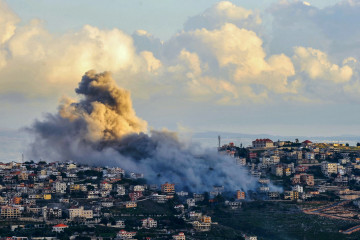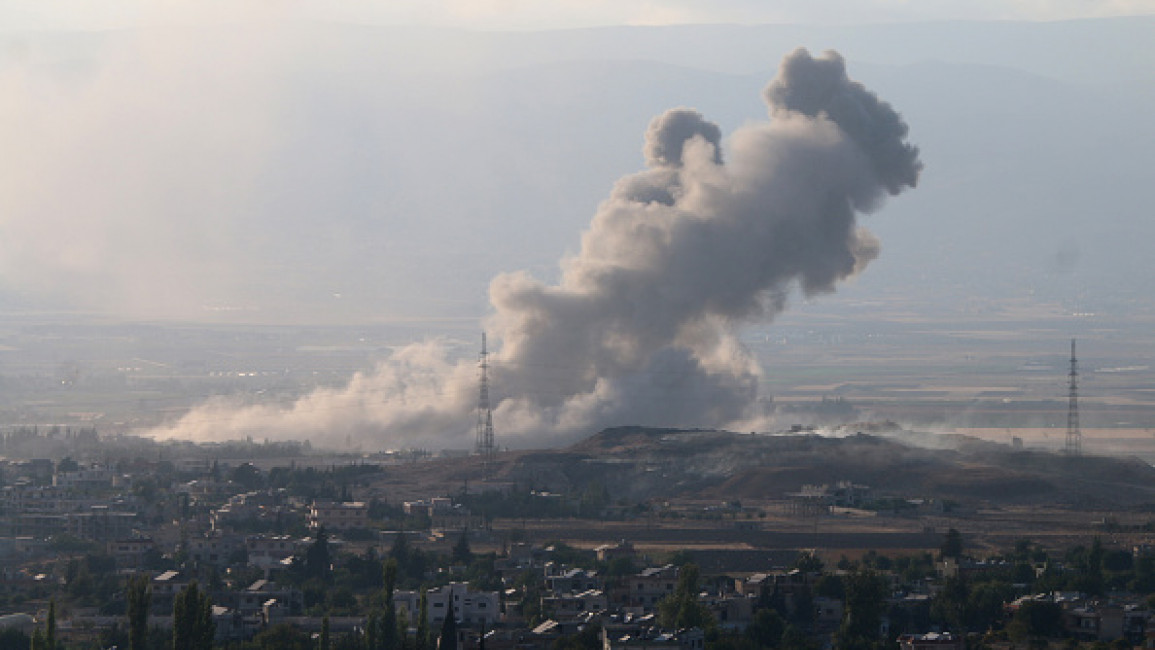

There has recently been an alarming escalation of the Israel-Hezbollah conflict. On 23 September, Lebanon experienced its deadliest day since the end of its civil war (1975-90), with more than 560 people killed and another 1,800 injured in a single day by Israeli airstrikes in the country's south and east.
Hezbollah maintains that it will continue fighting Israel until there is a ceasefire in Gaza. Israeli strikes against Lebanon continuing at this level of intensity will soon constitute a full-scale war.
This scenario would inevitably devastate Lebanon, with Hezbollah’s missiles and drones striking cities and many other targets across Israel. Such a conflict would add new layers of chaotic instability to the Middle East.
The pager and walkie-talkie explosions
The nearly one-year-old Israel-Hezbollah conflict entered a new and dangerous phase with the explosion of thousands of pagers and walkie-talkies in Beirut, elsewhere in Lebanon, and Syria on 17 and 18 September.
Israel did not officially claim responsibility for this operation but was undoubtedly behind it. The explosions resulted in dozens of deaths and thousands of injuries of Hezbollah members and civilians, including two children.
Days later, an Israeli airstrike destroyed a high-rise building in the Dahiyeh district south of Beirut, killing 31 people, including senior Hezbollah officials Ibrahim Aqil and Ahmed Mahmoud Wahbi.
Hezbollah responded by attacking northern Israel with dozens of rockets.
The unprecedented pager operation was Israel’s “attempt to psychologically weaken Hezbollah,” said Dr Karim Emile Bitar, a professor of international relations at the Saint Joseph University of Beirut, who spoke to The New Arab shortly after the second wave of explosions on 18 September.
“We are witnessing some sort of dystopia. If we saw this in a Netflix series or in a science fiction movie, we would have had trouble believing it. Hezbollah members were targeted while going along with their daily lives,” he added.
Dr Bitar said that the detonation of these electronic devices brought Lebanon “into uncharted territory”.
Revisiting the 'deterrence equation'
Beyond killing and terrorising as many Hezbollah members as possible, it is less than clear what Israel sought to accomplish by exploding thousands of telecommunication devices in Lebanon and Syria.
Nonetheless, what Tel Aviv did achieve through this operation was demonstrate that Israel has “in a way reinterpreted the deterrence equation with Hezbollah,” Michael Young, a senior editor at the Malcolm H. Kerr Carnegie Middle East Center in Beirut, told TNA.
“The Israelis do have a lot of information and intelligence on Hezbollah and therefore they can constantly destabilise Hezbollah. So, in terms of the deterrence equation, they’ve shown that they have many more options than Hezbollah does,” he observed.
But those explosions probably did not constitute any fundamental strategic shift in the Hezbollah-Israel balance of power. If the Israelis were to launch a ground invasion of southern Lebanon, Hezbollah would still retain its advantages.
“Even if, technically, Israel has shown its tremendous prowess with what happened [with the explosions on 17 and 18 September], I don’t think it’s going to have a fundamental impact on the outcome of a war between them," Young told TNA.
"Now, I could be wrong on this. But I still think Hezbollah is well prepared for a land war. They do have their weapons. They do represent a major force in south Lebanon. Maybe 2,000-3,000 young people have been injured, but I do think that Hezbollah has the manpower to absorb this.”
Impact on Hezbollah as a resistance group
The pager and walkie-talkie attacks constituted a big blow to Hezbollah less than two months after Israel killed its senior commander Fuad Shukr on 30 July. Some experts believe that the organisation’s image will suffer, both at home and throughout the Middle East.
“The success of the [telecommunication devices attacks] will do great damage to Hezbollah, sewing chaos and disunity within its ranks and lowering its prestige in the region,” according to Dr Joshua Landis, director of the Center for Middle East Studies at the University of Oklahoma, who recently spoke to TNA.
“Many Lebanese opponents of Hezbollah mocked the party and celebrated Israel's attack. Hezbollah has a reputation as a powerful and capable organisation. No longer,” he added.
With many people in Lebanon disagreeing with Hezbollah’s decisions, Young explained that resentment toward the organisation could grow among certain segments of Lebanese society.
“While there is no sympathy for Israel, at the same time there is a certain scepticism about Hezbollah’s strategic choices. The entry into the war has not been a popular decision in Lebanon at all,” Young said.
|
|
“So, I think that anything that highlights the weakness and the vulnerabilities of Hezbollah is something that can only reinforce a sense among many Lebanese, including among Shia, that Hezbollah is essentially in over its head and therefore this decision to enter the conflict on behalf of what was known as the unity of the arenas strategy was a big mistake,” he told TNA.
“As I said, the closer we get to the possibility of war, the more the criticism of Hezbollah will rise. No one in Lebanon really believes that the country is prepared for a war and of course they’re absolutely right. The country is not prepared for a war. Therefore…what we saw yesterday and today only shows Hezbollah’s vulnerabilities and these vulnerabilities will only encourage those who criticise the party and who decide to oppose it,” added Young.
Yet, some experts believe that despite the extent to which Lebanon’s society is extremely polarised, some greater unity among its citizens could be a consequence of the pager and walkie-talkie explosions.
“When there is such a massive attack, and when there are civilian victims, we see some sort of rally around the flag effect. Most political parties, including those which are vehemently hostile to Hezbollah, and most influencers, including those who usually criticise Hezbollah, have expressed solidarity towards the victims,” Dr Bittar said.
“So, unless Hezbollah itself launches a counter-offensive that would entangle Lebanon into a war that Lebanon can’t handle, for the moment we can count on, what I would say, a minimal degree of social cohesion in Lebanon.”
Israel dragging America into conflict
As Israel shifts attention more toward southern Lebanon and northern Israel following nearly one year of warfare in Gaza, Prime Minister Benjamin Netanyahu is thinking about much more than his country’s northern front.
The same Israeli leader who in 2002 lobbied the US to wage war against Iraq is today hellbent on drawing Washington into a wider war with the Iranians. The Israeli government’s objective is to see the US launch military strikes against Iran, which Israel has been threatening to do since the 1990s but has, at least until now, not done.
Israel’s razing of the Iranian diplomatic mission in Damascus on 1 April and killing of Ismail Haniyeh in Tehran roughly four months later were likely aimed at pulling Washington into a direct confrontation with Tehran.
“I do think that from the Israeli perspective anything that raises the probability of a conflict with Hezbollah, and therefore Iran, which means effectively a war in Lebanon…would enhance or increase the chances that the United States would at some point hit Iran, which is a dream of the Israelis,” Young told TNA.
As hostilities with Lebanon’s nuclear-armed neighbour continue escalating, Hezbollah’s focus will likely be on preventing Tel Aviv from achieving its strategic goal of making northern Israel safe for Israelis from there to return home.
As much as the Lebanese organisation has suffered huge blows in recent months, this does appear to be something that Hezbollah could realistically achieve.
“Hezbollah’s leadership has taken quite a beating this year, with strikes all over Lebanon and targeted assassinations. All costing significant civilian lives in the process,” Dr Nabeel Khoury, the former deputy chief of mission at the US Embassy in Yemen, said in a TNA interview.
“Hezbollah wants to strike back but is still holding back from all-out war - something that needs to be coordinated with Iran and worked out domestically, given that a significant part of Lebanon does not want to be dragged into a war that could well destroy much of Beirut and whatever is left of Lebanon's infrastructure.”
Despite US Secretary of State Antony Blinken and others in the Biden administration denying that the White House had any prior knowledge of Israel’s plans to carry out this month’s pager and walkie-talkie explosions, there is no denying that much blame belongs on Washington’s doorstep.
Israel going insane with almost twelve months of a high-tech slaughter campaign in Gaza and now throwing any caution it previously had to the wind in Lebanon are outcomes of Washington’s unwillingness to apply any pressure on Tel Aviv.
The irony is that the Biden administration has repeatedly stressed how its interests are in the Gaza war not expanding into Lebanon. But the White House’s disastrous foreign policy in the Middle East is responsible for exactly that occurring.
“All this points to at best a deterioration of US influence in the region and at worse a complicity and possible direct involvement which would put US interests in the region at great risk,” Dr Khoury told TNA.
With the one-year anniversary of 7 October approaching and the Gaza war further regionalising and internationalising, the chances of a catastrophic regional conflagration seem to be increasing with each hour that passes by.
Now, perhaps like never before, is a time for US-Iran diplomacy mindful of Washington, Tehran, and Hezbollah’s shared interest in seeing a full-scale war prevented before it’s too late.
Giorgio Cafiero is the CEO of Gulf State Analytics.
Follow him on Twitter: @GiorgioCafiero




 Follow the Middle East's top stories in English at The New Arab on Google News
Follow the Middle East's top stories in English at The New Arab on Google News


